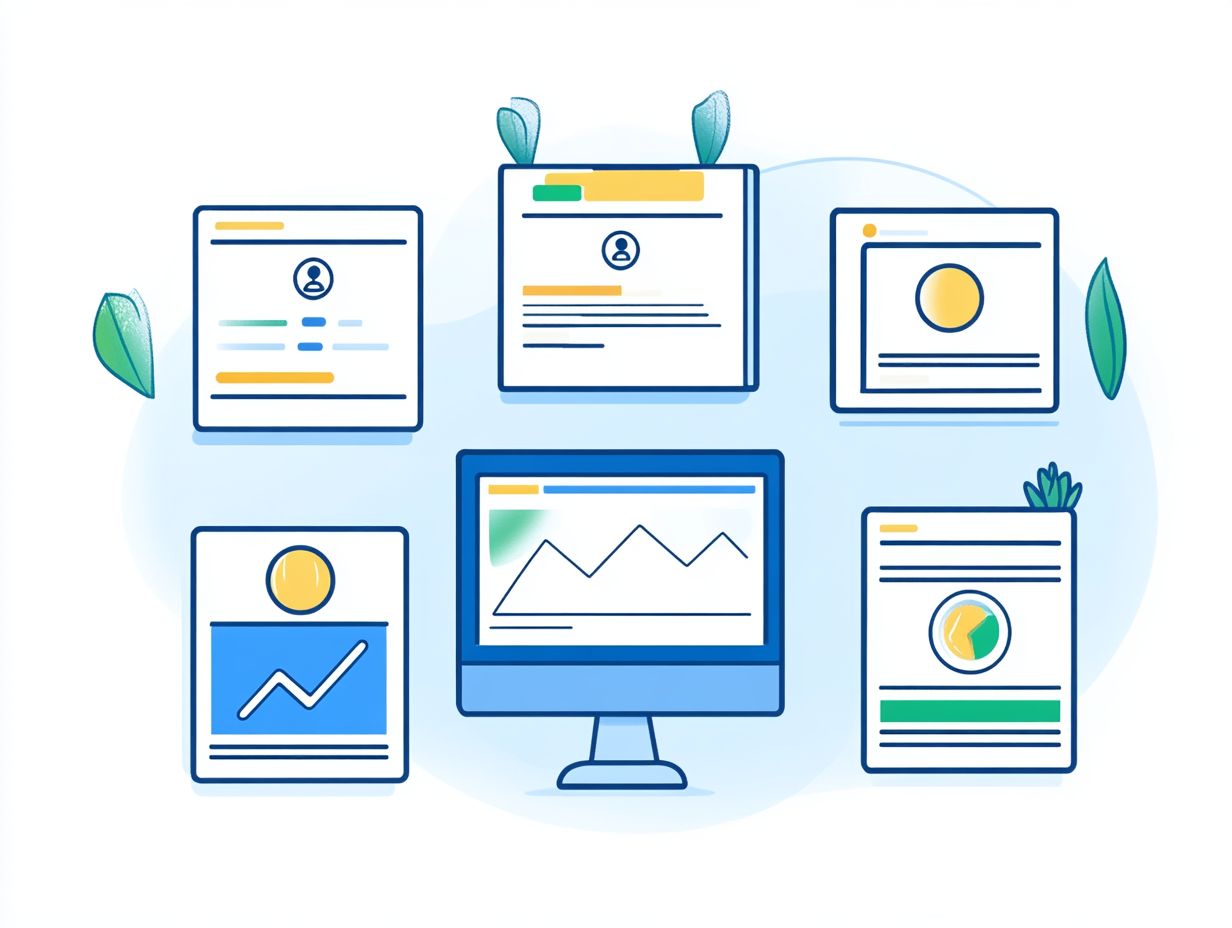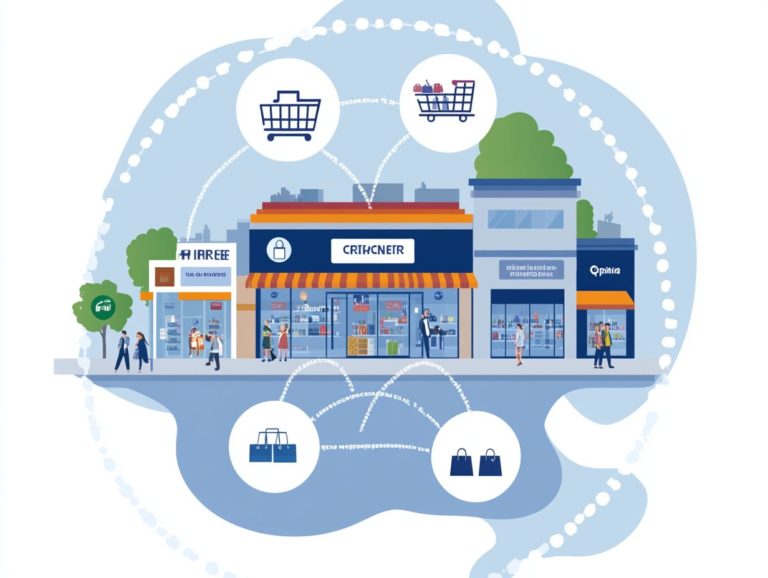49. 5 Essential CRM Features for B2B Companies
In today s fast-paced business landscape, mastering effective customer relationship management (CRM) is essential for you as a B2B company striving to thrive.
This article delves into five key CRM features: contact management, lead management, sales pipeline management, customer service and support, and analytics. You ll discover how these elements can elevate your business, explore the various types of CRM available, and consider the key factors for selecting the right system.
We ll also tackle common implementation challenges and provide tips to maximize the benefits of your CRM. Get ready to revolutionize your B2B operations now!
Contents
- Key Takeaways:
- 1. Contact Management
- 2. Lead Management
- 3. Sales Pipeline Management
- 4. Customer Service and Support
- 5. Analytics and Reporting
- How Can CRM Benefit B2B Companies?
- What Are the Different Types of CRM?
- What Are the Key Features of a Successful CRM for B2B Companies?
- How Can a B2B Company Choose the Right CRM for Their Needs?
- What Are the Common Challenges of Implementing a CRM for B2B Companies?
- How Can B2B Companies Make the Most of CRM for Their Business?
- Frequently Asked Questions
Key Takeaways:
- Organize and maintain accurate customer information with effective contact management.
- Track and prioritize potential customers through lead management to boost conversion rates.
- Utilize sales pipeline management to visualize and analyze your sales process for continuous improvement.
1. Contact Management
Effective contact management is crucial for B2B CRM systems like Salesflare, HubSpot, and Salesforce. These platforms offer you a structured way to organize customer data, maintain relationships, and boost productivity with features such as email tracking and integrated email solutions, as highlighted in the key features of CRM for event management.
You ll find that these systems provide seamless access to contact details, allowing your team to nurture leads and strengthen customer relationships efficiently.
Tools like business card scanners make data input quick and hassle-free. This functionality empowers you to automate follow-ups and track communication history, ensuring that no potential lead slips through the cracks.
For example, Pipedrive s email integration allows you to connect your email accounts directly to the CRM, facilitating smooth transitions between communication and record-keeping.
Similarly, Zoho CRM s robust email tracking feature alerts you when a client opens an email or clicks on a link, giving you valuable insights for timely follow-ups.
The addition of business card scanners further streamlines your process by instantly converting physical cards into digital contacts, saving you time and minimizing manual errors.
All these elements work together to create a more cohesive and efficient user experience, promoting better engagement and ultimately leading to higher conversion rates.
2. Lead Management
Lead management is an essential element of B2B CRM platforms like Salesflare and HubSpot, carefully designed to enhance your sales process. Lead management is the process of tracking and nurturing potential customers until they convert into sales.
By tracking sales leads, managing lead profiles, and automating workflows, these tools optimize your efficiency. When you implement effective lead management, you not only streamline these tasks but also gain invaluable insights into lead behavior and engagement trends.
This knowledge empowers you to tailor your sales approaches more effectively. By leveraging the automation tools available in CRMs such as Salesforce and Freshworks, you can nurture your leads with ease.
These platforms facilitate automatic follow-ups, monitor interactions, and segment leads based on their activities, ensuring your prospects receive timely and relevant information.
This proactive engagement significantly boosts your chances of conversion, allowing your sales team to focus on leads that demonstrate a higher intent. This approach leads to more successful closures and fosters long-term customer relationships.
3. Sales Pipeline Management

Sales pipeline management in B2B CRM solutions like Pipedrive and Salesforce is absolutely essential for you to visualize the sales process. It provides a clear overview of your opportunities, stages, and potential revenue through effective pipeline management techniques.
This structured approach not only helps you pinpoint bottlenecks but also empowers you with actionable insights for knowledge-based decision-making. Visual representations, such as charts and graphs, simplify complex data, allowing you to assess performance at a glance with ease.
Real-time notifications ensure you’re always in the loop regarding changes in the pipeline, enabling you to respond promptly to shifting priorities. Together, these features enhance your engagement, fostering a proactive sales environment where you can strategize effectively and ultimately drive revenue growth.
4. Customer Service and Support
Customer service and support are essential components of B2B CRM solutions like Freshworks CRM and Salesforce, allowing you to engage effectively with your customers. To maximize your setup, consider essential CRM features that ensure their satisfaction through streamlined communication and collaboration tools.
These systems often come equipped with advanced tools that help track and solve customer problems, enabling your teams to resolve customer issues efficiently and significantly reducing response times.
Chat support features offer real-time assistance, creating a seamless interaction experience that your customers will appreciate.
Robust feedback mechanisms empower your organization to gather valuable insights, fostering continuous improvement.
By prioritizing customer engagement, you nurture lasting relationships and enhance service quality, ultimately leading to higher client retention rates.
When your customers feel heard and valued, they are far more likely to remain loyal, driving growth and success for your business.
5. Analytics and Reporting
Analytics and reporting are essential components of B2B CRM systems, providing you with invaluable insights from customer data. This enables you to make informed decisions that enhance sales efficiency and elevate overall performance, much like the capabilities found in platforms such as Salesforce and Zoho CRM.
These tools offer a variety of analytics types, including predictive analytics, which uses data to predict customer behavior and sales trends. Real-time reporting allows you to track performance metrics instantaneously, keeping you in the know at all times.
These insights help refine your sales strategies and build better relationships with customers, as they enable you to identify actionable patterns and tailor your approach accordingly.
Platforms like G2 serve as a critical resource for you, offering comprehensive reviews and ratings on CRM features. This guidance helps you select the right tools that align with your specific analytical needs and objectives, ensuring you make choices that truly benefit your business.
How Can CRM Benefit B2B Companies?

CRM systems offer an array of benefits to B2B companies, enhancing your customer relationships and driving significant improvements in productivity and sales efficiency. These tools help you take charge by leveraging automation, streamlining your processes, and maximizing your results.
With these systems at your fingertips, you gain invaluable insights into customer interactions. Don t let potential sales slip away improve your lead tracking now!
By utilizing platforms like HubSpot, you can create personalized emails that engage your customers, significantly boosting engagement.
On the other hand, Salesforce allows your teams to effortlessly monitor communication across various channels be it emails or social media promoting better collaboration among departments. A tech startup boosted its lead conversion by 30% using CRM analytics for more targeted follow-ups.
This real-world example illustrates how strategically implemented CRM solutions can transform your business outcomes.
What Are the Different Types of CRM?
CRMs come in various forms, each meticulously crafted to meet distinct business needs, including both B2B and B2C systems, complete with specialized functionalities tailored to different customer engagement strategies.
In the B2B arena, CRMs concentrate on managing relationships with other businesses, placing a premium on tracking potential customers and guiding them through the sales process, along with sales pipeline tracking and comprehensive reporting capabilities. For instance, platforms like Salesforce and HubSpot equip you with tools designed to nurture leads through personalized communications and intricate sales cycles, while also highlighting essential CRM features for real estate.
On the flip side, B2C CRMs primarily focus on enhancing customer experience and engagement. They leverage features aimed at fostering brand loyalty through effective marketing campaigns and customer feedback mechanisms. Notable examples like Zoho CRM and Shopify are crafted to elevate the shopping experience, ensuring repeat business through targeted promotions and streamlined customer service interactions.
What Are the Key Features of a Successful CRM for B2B Companies?
Successful B2B CRM systems are designed with you in mind. They include essential tools like automation, email templates, and must-have CRM features for nonprofits, along with powerful reporting capabilities.
These features streamline communication and save time, allowing your sales teams to focus on what truly matters: closing deals.
A vital aspect of these systems is customization. This gives you the power to tailor workflows and fields to meet your unique requirements.
Integrating with platforms like Salesforce and HubSpot enhances effectiveness. This connection fosters a cohesive experience, boosting productivity so your sales teams can work smarter, not harder.
How Can a B2B Company Choose the Right CRM for Their Needs?

Choosing the right CRM for your B2B company requires assessing your needs. Consider pricing, features, and scalability to ensure alignment with your business goals. Additionally, for automotive dealers, understanding the must-have CRM features can significantly enhance your choice.
Start by defining your specific requirements. Think about how well the CRM integrates with your current tools and its ease of use.
After clarifying your needs, explore demo trials from various CRM vendors. This hands-on experience helps your team evaluate suitability firsthand.
Customer reviews are invaluable. They provide insights into other users’ experiences, helping you identify strengths and weaknesses of each platform.
Resources like G2 offer comparative reviews and ratings that simplify your decision-making process.
What Are the Common Challenges of Implementing a CRM for B2B Companies?
Implementing a B2B CRM can pose challenges like user adoption issues and moving your existing customer information to the new system. Addressing these requires careful planning.
If ignored, these obstacles can undermine your CRM’s effectiveness. User resistance might stem from unfamiliarity with the new system.
Involving key stakeholders early fosters buy-in and ensures their insights shape the implementation. A well-structured training program can empower employees to use the CRM effectively.
Providing ongoing support and encouraging open communication can boost user confidence and enhance system performance.
How Can B2B Companies Make the Most of CRM for Their Business?
B2B companies like yours can unlock amazing potential by embracing customer engagement strategies, optimizing how you track sales leads, and utilizing automation tools to boost productivity and streamline operations.
By prioritizing real-time data sharing among your team members, you can ensure that every department is aligned and informed, significantly enhancing collaboration.
For example, integrating a shared dashboard allows both your sales and marketing teams to access insights on customer interactions and the various stages of the sales funnel. This ultimately fosters a more cohesive strategy.
Regular training sessions empower your staff to fully leverage the CRM s features, such as lead scoring and pipeline management.
Emphasizing CRM adoption through incentives can motivate your teams further, leading to improved customer relationships and higher conversion rates.
Frequently Asked Questions
Here are some common queries about CRM features and benefits for B2B companies:
1. What are the essential CRM features for B2B companies?
The 5 essential CRM features for B2B companies are contact management, lead management, sales forecasting, customer analytics, and integration with other business tools.
2. How can contact management benefit B2B companies?
Contact management allows B2B companies to store and organize important client information, such as contact details, communication history, and notes. This helps in building stronger relationships and providing personalized services to clients.
3. What is the importance of lead management for B2B companies?
Lead management helps B2B companies track and manage their sales leads, from initial contact to conversion. This allows businesses to prioritize and nurture leads, increasing the chances of converting them into customers.
4. How does sales forecasting help B2B companies?
Sales forecasting is a valuable CRM feature for B2B companies, as it helps in predicting future sales and setting realistic goals. This allows businesses to allocate resources effectively and make informed decisions to drive growth.
5. Why is customer analytics crucial for B2B companies?
Customer analytics provides B2B companies with valuable insights into their customers’ behavior, preferences, and needs. This helps in tailoring marketing strategies, improving customer experience, and identifying potential upselling or cross-selling opportunities.
6. Can CRM integration benefit B2B companies?
Yes, CRM integration with other business tools, such as email marketing platforms and project management software, can streamline processes and improve overall efficiency for B2B companies. It also ensures that all data is synchronized across different systems, avoiding duplication and data inconsistencies.
To implement these strategies effectively, don’t hesitate to consult with experts to further enhance your CRM capabilities.






